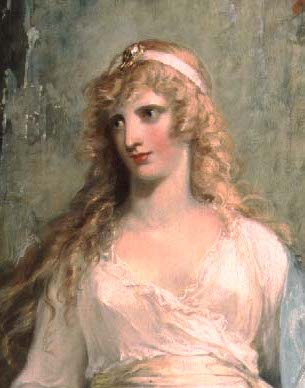Related Research Articles

Aeacus was a king of the island of Aegina in Greek mythology. He was a son of Zeus and the nymph Aegina, and the father of the heroes Peleus and Telamon. According to legend, he was famous for his justice, and after he died he became one of the three judges in Hades alongside Minos and Rhadamanthus. In another story, he assisted Poseidon and Apollo in building the walls of Troy.
Aegle is the name of several different figures in Greek mythology:

Amphiaraus or Amphiaraos was in Greek mythology the son of Oicles, a seer, and one of the leaders of the Seven against Thebes. Amphiaraus at first refused to go with Adrastus on this expedition against Thebes as he foresaw the death of everyone who joined the expedition. His wife, Eriphyle, eventually compelled him to go.
In Greek mythology, Chrysothemis or Khrysothemis is a name ascribed to several female characters in Greek mythology.
In Greek mythology, Rhodos/Rhodus or Rhode, was the goddess and personification of the island of Rhodes and a wife of the sun god Helios.

Gaius Julius Antiochus IV Epiphanes, the last king of Commagene, reigned between 38 and 72 as a client king to the Roman Empire. The epithet "Epiphanes" means "the Glorious".

In Greek mythology, Calypso was a nymph who lived on the island of Ogygia, where, according to Homer's Odyssey, she detained Odysseus for seven years against his will. She promised Odysseus immortality if he would stay with her, but Odysseus preferred to return home. Eventually, after the intervention of the other gods, Calypso was forced to let Odysseus go.
Gaius Antonius Hybrida was a politician of the Roman Republic. He was the second son of Marcus Antonius and brother of Marcus Antonius Creticus; his mother is unknown. He was also the uncle of the famed triumvir Mark Antony. He had two children, Antonia Hybrida Major and Antonia Hybrida Minor.
Polemon I Pythodoros was the Roman Client King of Cilicia, Pontus, Colchis and the Bosporan Kingdom. Polemon was the son and heir of Zenon and possibly Tryphaena. Zenon and Polemon adorned Laodicea with many dedicated offerings.
Decimus Haterius Agrippa was a Roman plebeian tribune, praetor and consul. He was the son of the orator and senator Quintus Haterius and his wife Vipsania.

Lucius Domitius Ahenobarbus was the son of consul Gnaeus Domitius Ahenobarbus and Aemilia Lepida. His mother was a paternal relative of the triumvir Marcus Aemilius Lepidus. His paternal grandmother was Porcia. Ahenobarbus married Antonia Major and through his son with her he became the grandfather of emperor Nero.

The Potamoi are the gods of rivers and streams of the earth in Greek mythology.
Pythodoris of Pontus, also spelled Pythodorida (Πυθοδωρίδα), was a Roman client queen of Pontus, the Bosporan Kingdom, Cilicia, and Cappadocia.
Acraea was a name that had several uses in Greek and Roman mythology.
Antonia was a Roman noblewoman who married the Greek nobleman Pythodoros of Tralles. She has been identified as the daughter of the general Mark Antony, presumably by his second wife Antonia Hybrida Minor. Theodor Mommsen was the first historian to identify Pythodoros' wife as the same woman as the daughter of Antony who was engaged to a son of the triumvir Lepidus. Mommsen's view has found wide acceptance but is not without its detractors.

Antonia Tryphaena also known as Tryphaena of Thrace or Tryphaena was a Pontian Princess and a Roman Client Queen of Thrace. She co-ruled with her son Rhoemetalces II.

Tiberius Julius Mithridates Philogermanicus Philopatris, also known as Mithridates III of the Bosporus, was a Roman client king of the Bosporus.

The gens Antonia was a Roman family of great antiquity, with both patrician and plebeian branches. The first of the gens to achieve prominence was Titus Antonius Merenda, one of the second group of Decemviri called, in 450 BC, to help draft what became the Law of the Twelve Tables. The most prominent member of the gens was Marcus Antonius.

Julia Iotapa, or simply Iotapa, daughter of King Antiochus III of Commagene, was Queen of Commagene, consort of her King brother Antiochus IV.
Dione is the name of four women in ancient Greek mythology, and one in the Phoenician religion described by Sanchuniathon. Dione is translated as "Goddess", and given the same etymological derivation as the names Zeus, Diana, et al. Very little information exists about these nymphs or goddesses, although at least one is described as beautiful and is sometimes associated with water or the sea. Perhaps this same one was worshiped as a mother goddess who presided over the oracle at Dodona, Greece and was called the mother of Aphrodite.
References
- ↑ The Civil Wars of Rome: Select Lives tr. with Notes by G. Long (1846) p. 196
- ↑ A to Z of Ancient Greek and Roman Women ISBN 978-0-816-06710-7 p. 24
- ↑ Plutarch, Pompey 24
- ↑ Tansey, Patrick (2010). "Antonia and the Pirates". The Classical Quarterly . 60 (2). Cambridge University Press: 656–658. doi:10.1017/S0009838810000315. JSTOR 40984840. S2CID 170176688.
- ↑ Draycott, Jane (May 22, 2018). "Cleopatra's Daughter". historytoday.com. History Today . Retrieved December 7, 2022.